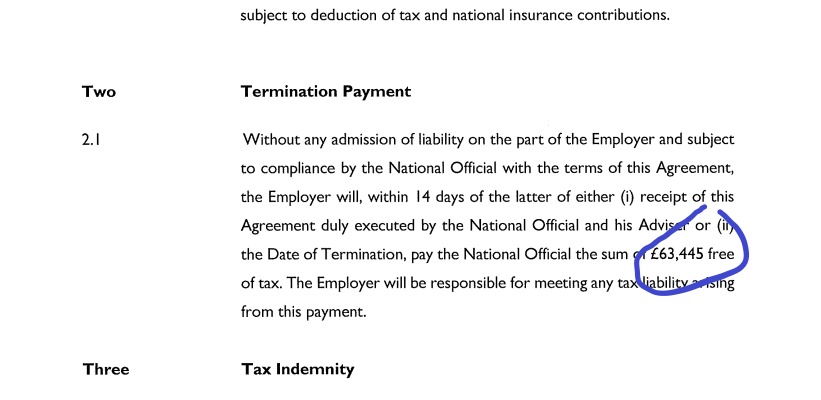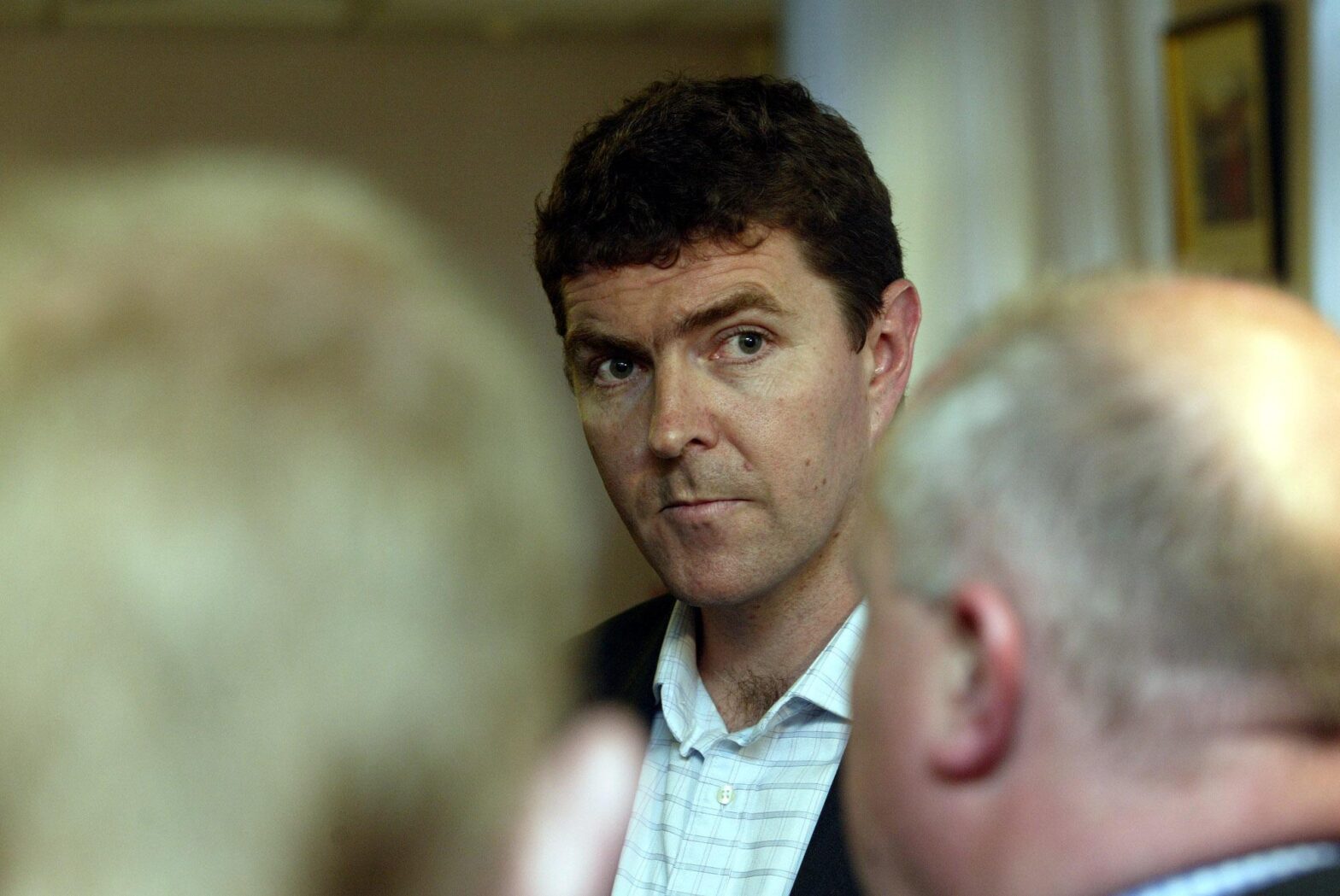THIS BLOG CAN REVEAL today that a senior official of the Fire Brigades Union (FBU) received a secret and unexplained tax-free payment of over £60,000 from union funds when he retired from the organisation.
John McGhee served as a national officer of the FBU for 16 years. During that time, he was one of the union’s most prominent and high-ranking officials. At the time of his departure in February 2017, he was receiving an annual salary of around £70,000 and stood to benefit from a generous pension entitlement. However, for reasons that are unclear, McGhee also left with a termination payment, authorised by the union’s leadership, amounting to £63,445. The leadership even agreed to meet any tax liability arising from the payment.
Full details of the transaction came to light last week after the union’s leadership admitted to the government’s trade union watchdog – known as the ‘certification officer’ – that it had acted unlawfully when denying a member access to accounting records containing information about the secret payment (under trade union law, all union members have the right to inspect any accounting record of their union). This admission came just 48 hours before a public hearing to consider a complaint from the member was due to take place in front of the certification officer, and after the leadership had spent seven months going to great lengths (including enlisting the help of one of the country’s top barristers, Oliver Segal KC) to stop the member seeing the records.
Having finally admitted that it had indeed broken the law, the leadership was forced to hand over the records to the member. However, in a desperate last-ditch attempt to stop details of the secret payment becoming more widely known, the union’s executive council passed a resolution which asserted that wider disclosure of the payment would breach McGhee’s right to privacy and threatened the member with disciplinary action if he dared to share the information (even if he shared it with fellow union members through the normal democratic structures of the union!).

These disturbing events represent the latest instalment in the FBU’s ‘hush money’ scandal, which has seen the union’s leadership exposed for having made termination payments to a string of employees (many of whom had made complaints of mistreatment) and then sought to hide details of those payments from the rest of the union through the use of non-disclosure agreements (NDAs). The affair has been covered extensively by this blog and has even reached the pages of Private Eye magazine.
The payment to McGhee was itself covered by a non-disclosure agreement. While this blog does not suggest that McGhee himself has acted improperly, the episode will undoubtedly place the leadership of general secretary Matt Wrack under the microscope once more, and lead to further questions about the manner in which a small group of senior officials based at the union’s head office have been caught authorising secret backroom deals involving vast sums of members’ money while at the same time attempting to stop those same members from knowing anything about those deals.
News of the secret payment to McGhee comes just days after this blog revealed that a serving national officer and close ally of Wrack – Riccardo la Torre – used union funds to bankroll his legal defence after publishing a libellous statement about a member late at night on his personal social media account. And last year this blog revealed that Wrack had authorised the purchase from union funds of deluxe fitness equipment worth over £2,000 for the personal use of a senior colleague at the union’s head office.
McGhee was one of three national officers – alongside Sean Starbuck and Paul Woolstenholmes – who departed the union with large pay-offs and non-disclosure agreements. This blog has obtained evidence showing that all three had, at some point during their employment, alleged that they had been mistreated by Wrack.
Woolstenholmes departed the union in 2015 with a confidential termination payment of £109,000 after alleging that Wrack had bullied him, while Starbuck left in 2021 with an exit package amounting to around £50,000 after making similar allegations against Wrack. The union was not required to make these payments as part of any contractual duty; they were one-off ex-gratia payments. As with McGhee, this blog does not suggest any impropriety on the part of Woolstenholmes or Starbuck.
Intriguingly, details of the termination payments were, in all three cases, conspicuously omitted by the union leadership from its annual financial return to the certification officer and in its annual financial statement to members – even though the leadership did disclose the regular salaries and benefits of these officials on those documents. That omission appears to constitute a breach of a law requiring the declaration of all such payments.
Other employees of the union have also had their silence bought over recent years after making allegations of mistreatment. These include former head of IT Bob Birchall who left in 2016 and former head of communications Lynne Wallis who departed in 2018. Both of these employees went with termination payments and NDAs.
Members and officials throughout the FBU will want to know why the leadership thought it was appropriate to spend huge amounts of money on buying the silence of several employees and then attempt to keep all details of those payments concealed from the rest of the union. If the leadership want to claim that the payments were all proper and above board, then they should give members the precise details and allow them to judge for themselves whether the payments were justified. But in the absence of any such explanation from the leadership – and also in light of the fact that the leadership felt the need to bury the payments inside NDAs – members are perfectly entitled to assume that the payments did not arise from any legal obligation on the part of the union and that they were made for other reasons.
The events surrounding the departures of McGhee, Woolstenholmes and Starbuck are particularly troubling. These three officials were all elected by members of the union to serve them as national officers. Yet all three left the union abruptly and in mysterious circumstances.
What does it tell us about a leadership that thinks it should have the power to edge out officials who were elected to their positions by the union’s membership and simultaneously to pay those officials large amounts of money to keep quiet about the circumstances of their departure? Such conduct strikes at the heart of the principles of democracy, accountability and transparency and is indicative of a leadership that treats members with contempt and their money with disregard. It is also a far cry from the promise, made by Wrack when he came to power, to ‘open the books’ and put members in control of finances.
Far from opening the books and putting members in control, the Wrack leadership has increasingly resorted to obfuscation and secrecy in the area of union finances. As this blog revealed earlier this month, Wrack even recently went to the extreme and unprecedented lengths of denying a legitimate request for information regarding the pay-offs and NDAs from a member of the union’s ruling executive council acting on a mandate from his regional committee. It really comes to something when executive council members are effectively prevented from doing their jobs as a result of the authoritarian actions of a general secretary desperate to hide all trace of controversial financial transactions he has authorised.
This is not what democratic trade unionism is about. On the contrary, what we are witnessing is the very antithesis of democratic trade unionism. Wrack almost certainly understands this. But he doubtless also recognises that he is in too deep, and cannot attempt to rectify the situation without exposing his own role in the scandal and therefore seriously damaging his own credibility. So he persists in telling everyone that there is ‘Nothing to see here’ when the reality is that there is an awful lot to see here.
The blatant misuse of members’ money, and the efforts by the leadership to conceal the facts – even from, in some cases, the executive council itself – almost certainly amounts to a breach of the union’s rules. Though such is the lack of integrity and principle at the top of the union these days, it is hard to see any circumstances in which an impartial investigation is carried out.
Ultimately, these appalling events stand as yet more evidence that the FBU leadership has seriously lost its way. The ‘hush money’ affair has been a PR catastrophe for the union. The leadership got itself into the most God-awful mess by using huge sums of members’ money to pay off several employees and then attempting to keep the details of those payments hidden through the use of NDAs. You might be able to get away with that sort of behaviour in a private company, but you can’t expect to get away with it in a democratic organisation funded by membership subscriptions. And you certainly can’t expect to get away with it when the law explicitly provides for members to inspect any accounting record of the organisation.
As the leader of the union, the buck for this scandal stops with Matt Wrack. These events happened on his watch, and he must take responsibility. What is clear is that, in presiding over this ignominious episode, Wrack has forfeited the trust of FBU members. He must now do the honourable thing and resign.

